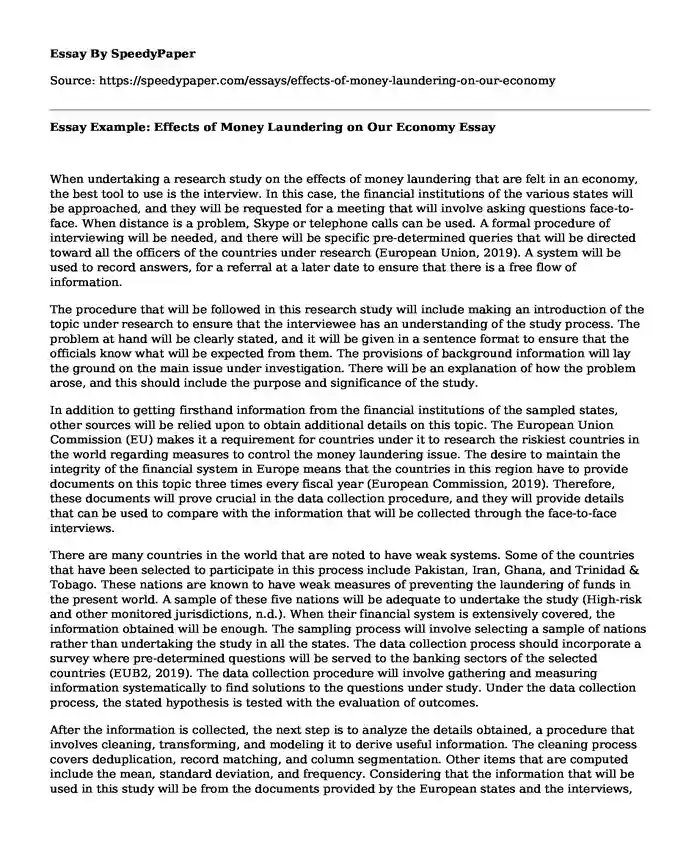
| Type of paper: | Essay |
| Categories: | Economics Problem solving Money |
| Pages: | 3 |
| Wordcount: | 705 words |
When undertaking a research study on the effects of money laundering that are felt in an economy, the best tool to use is the interview. In this case, the financial institutions of the various states will be approached, and they will be requested for a meeting that will involve asking questions face-to-face. When distance is a problem, Skype or telephone calls can be used. A formal procedure of interviewing will be needed, and there will be specific pre-determined queries that will be directed toward all the officers of the countries under research (European Union, 2019). A system will be used to record answers, for a referral at a later date to ensure that there is a free flow of information.
The procedure that will be followed in this research study will include making an introduction of the topic under research to ensure that the interviewee has an understanding of the study process. The problem at hand will be clearly stated, and it will be given in a sentence format to ensure that the officials know what will be expected from them. The provisions of background information will lay the ground on the main issue under investigation. There will be an explanation of how the problem arose, and this should include the purpose and significance of the study.
In addition to getting firsthand information from the financial institutions of the sampled states, other sources will be relied upon to obtain additional details on this topic. The European Union Commission (EU) makes it a requirement for countries under it to research the riskiest countries in the world regarding measures to control the money laundering issue. The desire to maintain the integrity of the financial system in Europe means that the countries in this region have to provide documents on this topic three times every fiscal year (European Commission, 2019). Therefore, these documents will prove crucial in the data collection procedure, and they will provide details that can be used to compare with the information that will be collected through the face-to-face interviews.
There are many countries in the world that are noted to have weak systems. Some of the countries that have been selected to participate in this process include Pakistan, Iran, Ghana, and Trinidad & Tobago. These nations are known to have weak measures of preventing the laundering of funds in the present world. A sample of these five nations will be adequate to undertake the study (High-risk and other monitored jurisdictions, n.d.). When their financial system is extensively covered, the information obtained will be enough. The sampling process will involve selecting a sample of nations rather than undertaking the study in all the states. The data collection process should incorporate a survey where pre-determined questions will be served to the banking sectors of the selected countries (EUB2, 2019). The data collection procedure will involve gathering and measuring information systematically to find solutions to the questions under study. Under the data collection process, the stated hypothesis is tested with the evaluation of outcomes.
After the information is collected, the next step is to analyze the details obtained, a procedure that involves cleaning, transforming, and modeling it to derive useful information. The cleaning process covers deduplication, record matching, and column segmentation. Other items that are computed include the mean, standard deviation, and frequency. Considering that the information that will be used in this study will be from the documents provided by the European states and the interviews, the accuracy and relevancy of the data will be improved for these details will be from different quarters.
References
European Union, United Kingdom. (2019, 23 September). EU black and grey lists of high-risk countries back on the agenda. Lexology. Retrieved from https://www.lexology.com/library/detail.aspx?g=50bd5aea-a68e-40c4-96e0-518f29b44d87
European Commission. (2019, 13 February). European Commission adopts new list of third countries with weak anti-money laundering and terrorist financing regimes. Retrieved from https://ec.europa.eu/commission/presscorner/detail/en/IP_19_781
EUB2. (2019, February 13). Money laundering: EU list of high-risk third countries. Retrieved January 29, 2020, from https://www.eubusiness.com/topics/finance/money-laundering
High-risk and other monitored jurisdictions. (n.d.). Retrieved January 29, 2020, from http://www.fatf-gafi.org/publications/high-risk-and-other-monitored-jurisdictions/?hf=10&b=0&s=desc(fatf_releasedate)
Cite this page
Essay Example: Effects of Money Laundering on Our Economy. (2023, Apr 05). Retrieved from https://speedypaper.com/essays/effects-of-money-laundering-on-our-economy
Request Removal
If you are the original author of this essay and no longer wish to have it published on the SpeedyPaper website, please click below to request its removal:
- V for Vendetta - Movie Review Essay Example
- Free Essay Containing a TOEFL Waiver Request Letter Sample
- Personal Essay Example: My Current Goals
- Free Essay on Susan B. Antony and Elizabeth Candy Station - Historical Perspective Analysis
- The Functions of the INTERPOL, Free Essay for Students
- Stars and Culture Essay Sample
- Free Essay. McKinsey and Company Consulting Firm PESTEL Analysis
Popular categories




